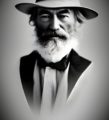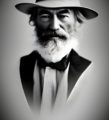George Orwell, whose real name was Eric Arthur Blair, was a British author and journalist born on June 25, 1903, in Motihari, India

He is widely regarded as one of the most influential writers of the 20th century, known for his dystopian novels and penetrating social commentary. Orwell’s works continue to resonate with readers around the world, as they explore themes of totalitarianism, government surveillance, propaganda, and the struggle for individual freedom.
Orwell’s literary career spanned over two decades, during which he wrote several notable novels, essays, and journalistic pieces. His best-known works include “Animal Farm” (1945) and “Nineteen Eighty-Four” (1949), both of which have become literary classics and are often taught in schools.
“Animal Farm” is a satirical allegory that tells the story of a group of farm animals who overthrow their human farmer and establish their own egalitarian society. However, over time, the pigs, who represent the ruling class, gradually become corrupted by power and institute a new oppressive regime, mirroring the corruption of totalitarian governments.
“Nineteen Eighty-Four” is perhaps Orwell’s most famous work, and it paints a bleak picture of a dystopian future where an all-powerful Party controls every aspect of people’s lives. The protagonist of the novel, Winston Smith, rebels against the Party’s oppressive rule and engages in a forbidden love affair, ultimately paying a heavy price for his defiance.
Orwell’s writing is characterized by its clarity, simplicity, and unflinching honesty. His prose is masterful in its ability to convey complex ideas and emotions in a concise and impactful manner. Through his works, Orwell sought to expose the dangers of totalitarianism and the erosion of individual freedoms, while also commenting on the political and social realities of his time.
In addition to his novels, Orwell also wrote numerous essays and journalistic pieces, many of which remain relevant today. Some of his most notable essays include “Politics and the English Language,” where he explores the connection between language and thought, and “Shooting an Elephant,” a personal account of his experience as a colonial police officer in British-ruled Burma.
Orwell’s writings were deeply influenced by his own experiences, particularly his time in the Spanish Civil War, where he fought against the fascist forces. This experience, along with his later travels and observations of totalitarian regimes, shaped his perspective on politics and informed his writing.
Despite his untimely death from tuberculosis at the age of 46, Orwell’s literary legacy continues to endure. His works have been translated into numerous languages and have sold millions of copies worldwide. Orwell’s ideas and concepts, such as Big Brother, thoughtcrime, and Newspeak, have entered the public lexicon and become synonymous with oppressive regimes and the erosion of civil liberties.
[Historical Development of George Orwell’s Books]
George Orwell’s books have had a profound impact on literature and continue to captivate readers to this day. Let’s take a closer look at the historical development of his works and how they have evolved over time.
1. Early Works:

Orwell began his writing career as a journalist, working for various newspapers and publishing his first book, “Down and Out in Paris and London” in 1933. This semi-autobiographical work provided a gritty portrayal of poverty and the harsh realities of life in the lower strata of society.
2. Political Awakening:
Orwell’s experiences during the Spanish Civil War and his growing disillusionment with Stalinism heavily influenced his subsequent works. His time fighting against Franco’s forces in Spain inspired him to write “Homage to Catalonia,” a memoir that reflects on the complexities and betrayals of the war.
3. Animal Farm:
Published in 1945, “Animal Farm” was Orwell’s first major success. This satirical novella, which uses farm animals as metaphors for political figures and events, was an allegory of the Russian Revolution and the rise of Joseph Stalin. The book received critical acclaim and established Orwell as a prominent voice against totalitarianism.
4. Nineteen Eighty-Four:
The publication of “Nineteen Eighty-Four” in 1949 solidified Orwell’s reputation as a visionary writer. This dystopian novel warned of the dangers of totalitarianism and explored themes of surveillance, control, and the manipulation of truth. “Nineteen Eighty-Four” garnered widespread praise for its chilling portrayal of a future ruled by an oppressive regime.
5. Posthumous Works:
Following Orwell’s death in 1950, several of his unfinished works and essays were published posthumously. These include “A Collection of Essays,” “Such, Such Were the Joys,” and “The Collected Essays, Journalism, and Letters of George Orwell.” These works offer further insights into Orwell’s political beliefs, literary style, and personal experiences.
The enduring relevance and popularity of Orwell’s books can be attributed to their timeless themes, compelling characters, and thought-provoking social commentary. His critiques of totalitarianism and his warnings about the dangers of unchecked state power are as relevant today as they were when he first penned them.
In conclusion, George Orwell’s books hold a significant place in literary history, offering profound insights into the human condition and the perils of authoritarianism. Through his powerful narratives, Orwell continues to inspire readers to question authority, challenge oppressive systems, and value individual freedom. Whether it’s the political allegory of “Animal Farm” or the dystopian nightmare of “Nineteen Eighty-Four,” Orwell’s works remain essential reading for anyone interested in exploring the complexities of power, politics, and the fight for liberty.
FAQ
What are George Orwells most famous books?
What are the main themes in George Orwells works?
How did George Orwells experiences influence his writing?
Flere Nyheder
Erhvervsfotografering i Aalborg: God for forretningen
He is widely regarded as one of the most influential writers of the 20th century, known for his dystopian novels and penetrating social commentary. Orwell’s works continue to resonate with readers around the world, as they explore themes of tot...
01 juni 2025
Galleri Nordjylland: Kunsten i Hjertet af Vendsyssel
He is widely regarded as one of the most influential writers of the 20th century, known for his dystopian novels and penetrating social commentary. Orwell’s works continue to resonate with readers around the world, as they explore themes of tot...
04 november 2024
Erhvervsfotograf – Din nøgle til professionelt visuelt indhold
He is widely regarded as one of the most influential writers of the 20th century, known for his dystopian novels and penetrating social commentary. Orwell’s works continue to resonate with readers around the world, as they explore themes of tot...
14 marts 2024
Plakater til mor: Den perfekte gave er hylder kærlighed og taknemmelighed
He is widely regarded as one of the most influential writers of the 20th century, known for his dystopian novels and penetrating social commentary. Orwell’s works continue to resonate with readers around the world, as they explore themes of tot...
06 marts 2024











